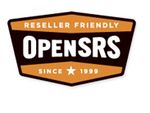OpenSRS
 | |
| Type: | Subsidiary of Tucows |
| Industry: | Internet |
| Founded: | 1999 |
| Headquarters: | Toronto |
| Country: | Canada |
| Website: | www.opensrs.com |
| Blog: | OpenSRS Blog |
| Facebook: | OpenSRS |
| LinkedIn: | OpenSRS |
| Twitter: | |
| Key People | |
| Elliot Noss, President & CEO | |
OpenSRS is a domain names re-seller services division of Tucows, a company based in Canada engaged in providing domain name and other internet related services such as e-mail, SSL certificate etc. The company has a portfolio of more than 11 million domain names. [1]
Background edit
On January 2000, OpenSRS platform was launched by Tucows after the company received its accreditation from ICANN as a registrar on April 1999. The company started registering domain names under the .com, .net and .org domain space. The company added .ca (Canada) and .uk (United Kingdom), .tv (Tuvalu), .cc (Cocos), .us (United States), .cn (China), and .de (Germany) country code top level domain names (ccTLD]] as well as .info, .biz, and .name generic top level domain names (gTLDs) during the latter part of the year. In 2007, Tucows's wholesale reseller services division as OpenSRS Resellers.[2]
Services edit
OpenSRS offer the following services:[3]
- Domain Service- provides domain name registration for more than 100 TLDs.
- Trust Service- sells SSL certificates, website security (SiteLock and GeoTrust) and Truste Privacy policy plans.
- Publishing Service- offer goMobi, a website builder and hosting service for mobile phones.
- OpenSRS Offers- provides opportunity for its re-sellers to offer Google Adwords credits without additional costs
- Hosted Registrar Service (OpenHRS)- a cost effective solution registration infrastructure for registrars
ICANN Involvement edit
OpenSRS actively participates in the different activities and meetings of the Internet Corporation for Assigned Names and Numbers. The company is represented by some of its staffs including Solomon Amoako [4] and Adam Eisner, who was present during the ICANN 41 meeting in Singapore.[5] The company's blog is also dedicated in providing information and updates about the different events, issues and policies being discussed within the ICANN community and entire domain industry.
In 2001, a group of OpenSRS RSP (Registration Service Providers) along with a number of Internet Service Providers (ISP's) and Internet Presence Providers (IPP's) wrote a letter to former ICANN President Stuart Lynn regarding the claims of Roger Cochetti, Verisign Senior Vice-president of Policy that the company is suffering from a massive unauthorized transfer of domain names. According to him, 24 percent of Verisign’s registrants did authorize the transfer of their domain names out of Verisign. This prompted Verisign to implement safeguards for their customers within the legal framework such asking registrants to submit a notorized statement that they wish to transfer their domain names from Verisign to another registrar. Cochetti also requested ICANN to develop new policies regarding the issue. [6]
The OpenSRS RSPs and ISPs/IPPs denied Cochetti’s claims and argued that the survey was inconsistent. The group explained that the ISPs/ IPPs handled the domain name registrations for their customers for many years with their consent. According to them, their customers expected that their ISPs/IPPs to transfer their domain names on their behalf when company’s like Tucow and BulkRegister.com offered competitive price for domain name registration. In addition, the group emphasized that the domain transfer were done to provide better service for their customers. In connection, the group informed ICANN that the strategy implemented by Verisign regarding the transfer of domain names is not effective and it is a delaying tactic until the domain names pass the renewal date and Verisign will have a reason to deny transfers and asked customers to pay the $35 renewal fee before releasing the domain names. They pointed out that Verisign’s action is anti-competitive and they feel offended of being accused of conducting“domain slamming.” They requested ICANN to reject Verisign’s proposal for the development of policies that prohibiting domain transfers.[7]
References edit
